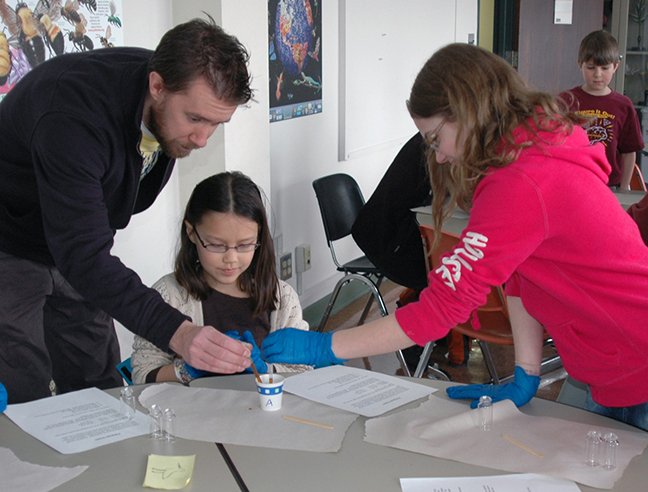Tips for volunteers
Fun is the most important ingredient for our outreach program visits. The audience will appreciate your enthusiasm, and young people may respond by wanting to be future chemists.
Don't worry. If you're new, you will be paired with an experienced demonstrator until you feel comfortable with the experiments and interacting with audiences. Experienced volunteers are a great resource for advice.
You have your own presentation style, so relax and enjoy the experience. Our demonstrations are safe and reliable. Your role is to explain the mechanics of the experiments in terms that the audience can understand, appreciate, and apply to every day life. This is an opportunity for teachers and students to transform classrooms into laboratories and themselves into real scientists.
Don’t fill the entire presentation time with your voice—silence is OK.
Demonstration tips
Involve your audience as much as possible. Ask for volunteers. Ask questions that engage student in thinking about the experiments: What did they observe? What can they conclude from their observations? What are some practical applications?
Gathering information
Gather specific information about your visit. Some questions to ask:
- Ask if you are serving as a role model?
- Are you presenting a lesson?
- Are you talking about careers?
- Is this a small-group presentation?
- A large-group demonstration?
- A hands-on/minds-on investigation?
- A school assembly program?
- Are you facilitating discussion groups?
- What is the time length of the presentation?
Know the audience
- Number of students
- Ages, grade levels, and science knowledge
- Experiments that students have seen, done, or will be doing
Know the facility
- What is the arrangement of the room?
- Are running water and electricity available?
- Is the room carpeted?
- Does the room have proper ventilation?
- Are fire extinguishers available (must be)?
- Is there space and tables so materials and supplies can be available for student use?
Make safety a priority
- Wear goggles and lab coats.
- Provide goggles and lab coats to volunteers.
- Ensure that there is proper adult supervision.
- Ensure that the audience is safe.
- Demonstrate proper techniques and procedures.
- Consider the impact of the demonstrations; particularly, if they involve explosions and fire.
- Off-campus facilities cannot handle demonstrations that involve concentrated reagents.
- Stress that all chemicals must be treated with respect.
- Take only the amount of chemicals needed.
- Leave no waste behind—bring garbage bags, do not throw waste/garbage into containers at the school.
Help students learn
- Tailor experiments to the ages, grade levels, and ability levels of the students.
- Tailor experiments to real-life experiences, illustrating that chemistry is all around us.
- Encourage students to express their explanations of what they are observing: challenge students to explore if their explanations make sense.
- Explain scientific concepts correctly; but, in language that students can understand.
- Involve as many students as possible.
- It's OK to say, "I don't know," "Let's find out," What do you think?"
- Let them know that scientists are trying to figure some important issues out, and perhaps they can be scientists who help.
Be a resource for teachers
Provide your contact information and share a list of follow-up questions, research, or discussion topics.
